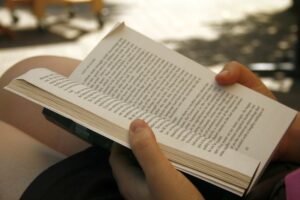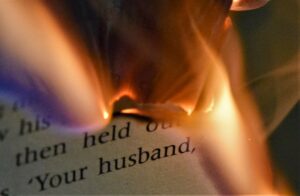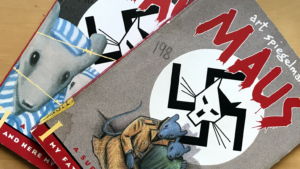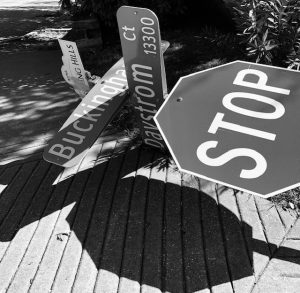Posts by Kim Bullock
Two-and-a-half years ago, after a vocal minority began storming into school board meetings across the state of Texas and demanding that an increasingly long list of books be removed from library shelves, I felt personally attacked. I am sure many writers do when book banning becomes rampant.
When I looked over the list of ‘uncomfortable’ books being challenged, I saw a lot of familiar titles, novels I had been required to read in junior high. 1984. Animal Farm. Maus. Night. Anne Frank: Diary of a Young Girl. My teacher, whom I still keep in touch with, taught us that education was our best weapon against history repeating itself, and that one of the biggest danger signs to watch for is the backlash against intellectualism. A dumbing down of the curriculum. A whitewashing of history.
This is exactly what I saw happening. So, so many of the books being removed from libraries were about race, about the Holocaust, and, of course, anything with LGBTQIA+ themes, no matter how wholesome the actual story. Why, I asked myself, are the adults in the room not wanting the kids to learn to recognize fascism? To recognize antisemitism? To know that families come in many forms?
As I discussed in this post from 2022, my idea to put up a Little Free Library in my yard progressed quickly. I live in a corner house on a well-travelled street near two public schools. Four additional schools have bus stops in my yard. It’s a perfect location.
I got quite a lot of support from the Writer Unboxed community when I started this project, so I thought you might like an update for how things are going now that the library, which is named Maus House thanks to our own Heidi Lacey, is well established in my neighborhood.
–Hundreds of books have been ‘checked out’ each year.
–More than I expected get returned.
–Teachers donate a lot of books from their classroom libraries. Neighbors donate as their kids outgrow books.
–Word has spread that I have a Read in Color library; the majority of my patrons are minorities.
–Traditional literature is ignored unless it is on a banned list.
–Deep-themed YA books fly out of there. So do fantasy books.
–People love signed books. ARCs go fast, too.
–LGBTQIA+ books are usually gone in a few days and, yes, it is teens taking them. I have been thanked for stocking them both on the app and in person.
Even if you have no interest in using a Little Free Library as a means of quiet activism, it can be a rewarding way to help promote literacy and an excuse to buy more copies of books written by your friends! (Easily a dozen copies of Vaughn Roycroft’s novels have passed through my library into readers’ hands, so I keep buying them.)
A few tips if you want to open your own library…
Be patient
It takes time for people to learn where your library is and how it works. People are not programmed to walk onto someone’s property and just take something without knowing for certain that’s what it is there for. Putting out a flag inviting them to take or leave a book helps. I added my library to the map on the Little Free Library app, which […]
Read More
Set my daughters loose in a bookstore and it’s guaranteed they will make a game of pointing out novels they are certain I’ve either read or will buy.
“The covers are all the same,” my younger daughter points out. “A woman in period dress with her back turned.”
“Bonus points if there’s a war motif in the background,” my older daughter adds.
They aren’t wrong, though there is some variation. The woman might be shown with a child, other women or, occasionally, with a man. Sometimes only part of the woman shows—there are an alarming number of headless or semi-headless women on book covers. The style of dress changes, and so does the war. After reading several WWII era books, I like to mix it up and throw in one from WWI or, if I’m feeling spicy, one from the Civil War or Vietnam.
This reading rut began when my preference for “triumph of the human spirit” stories collided with an explosion of war novels suddenly appearing on bookshop shelves. Since my WIP at the time took place partly during WWI, I convinced myself that bingeing such novels counted as work time. I needed comp books, after all. I needed to analyze how other authors built their worlds, how they made the past feel not only real but relevant to the present, how they worked in historical detail without the dreaded info-dump. I also needed to watch for places where my mind started to wander and puzzle out why so I could avoid repeating such mistakes in my own manuscript.
Reading slowly became more chore than pleasure. Go figure.
My yearly book logs have steadily grown shorter over the last decade. I was down to nine books read for all of 2023. The problem, I had to admit to myself, was self-inflicted. I only read what I should read, and with purpose—an authorly version of a high school English class. No wonder I picked up my “assigned” books with reluctance rather than anticipation, soldiering on and finishing most of them, though it might take me a month to muddle through. No wonder I found myself re-reading the same paragraphs over and over while my brain simultaneously made a grocery list and debated whether moving my leg out from under a sleeping dog would make me a horrible human.
With rare exceptions, even stories that checked off all the boxes for what I’d once considered to be a fabulous read fell flat. I didn’t blame the authors for this, and I certainly left no lukewarm reviews because I suspected the problem stemmed from me. Maybe I’d simply read too many similar stories. Maybe I found the parallels between, say, a novel set in 1930s Germany and the reality of life in the United States in 2024 too unsettling to adequately lose myself in that world. Maybe I was too beaten down by the news, the election, and the endless medical drama my family faces to have the emotional bandwidth to connect to characters I might have loved in simpler times.
This ennui has transferred over into my writing as well. I have two WIPs (one historical, one contemporary) and, even though I love both stories, it’s become too easy to put off writing for another […]
Read MoreImagine a ballroom filled with 120 writers. Many have met at past UnCons, retreats, or other events, but others are connected only through social media, comments on the Writer Unboxed blog or, perhaps, a past attendee. Some are New York Times bestsellers. Some are indie authors. Some have multiple manuscripts tucked away and could wallpaper a room with rejections. Some are so blocked and discouraged that it’s impossible to finish their manuscript, let alone submit it. Some are wide-eyed and plugging away at their very first novel. One is better known as a literary agent.
Now imagine these writers haunting Salem’s Derby Wharf neighborhood for five days in early November; sharing rooms at the Salem Waterfront Hotel, pulling tables together at pubs, touring the Peabody Essex Museum, buying spells or talismans for creativity and focus, walking in tightly knit clumps down the same narrow, historic streets where Nathaniel Hawthorne once strolled. They traverse between the hotel and the House of the Seven Gables to attend lectures on voice, character development, and how to rescue a sagging middle.
Notebooks are filled. Laptop batteries scream for more juice. Brains explode.
In true UnCon tradition, classes on how to snag an agent or whether to self-publish are conspicuously absent from the schedule. There are no anxiety-riddled pitch sessions. No one jockeys for position to pigeonhole Donald Maass or anyone else at the hotel bar. Want to chat? Meet in the ballroom after that bar has closed. Pour a scotch from one of the many bottles on the center table. Pull up a chair. Relax.
We are all just writers here.
The Writer Unboxed Un-Conference is always, well, unboxed. An experiment. A risk. It might have been an utter disaster in 2014, after the unexpected passing of Writer Bob, or in 2016, on an election night that left most of us shell-shocked. It wasn’t, though, in large part because Therese Walsh has an uncanny ability to attract the type of people who check their egos at the door and open their arms (figuratively and literally) to everyone.
Magic, and not of the witchy variety, has occurred in Salem, Massachusetts four times now.
Magical Moments at UnCon 2023 (Beyond the Sessions)
Sharing the Prize
Kristin South won the WU Scholarship prize this year. My mouth literally hung open while Therese Walsh read these opening lines of Kristin’s amazing essay: My ancestor was a witch, hanged in the town square some forty years before Salem. Goodwife Bassett’s crimes included pointedly observing that the local elders didn’t allow non- Puritans to vote and ‘holding her head full high.’
Then we learned that Kristin, upon learning she had won, asked Therese if there was another writer who had come close, someone who also would be attending the conference, with whom she might share her prize. Lisa Bodenheim fit that bill. The two women, holding their heads full high, shared the glory.
Sandwiched by Therese Fowler and Therese Walsh
That Keynote Speech
Right on the heels of Kristin’s gesture–the epitome of UnCon spirit–and Therese Walsh’s provoking speech on the power of chaos to propel character, story, and even your life as a writer forward, we had Therese Anne Fowler’s keynote address.
For those of you who don’t know, “the other Therese” is the New York […]
Read More
A few months ago, I joined a Pilates studio. An odd choice given that my elementary school gym teacher once accused me of not trying when my fingertips stopped at knee level during an attempt to reach down and touch my toes. The only thing worse than my flexibility is my balance.
My last plié was executed in 1978 with all the grace of a drunk hippo. Repeating the performance in 2023 while standing atop a Bosu ball might have made me question my life choices if I weren’t grappling with the even greater challenge of following verbal instructions for an hour. Processing and implementing what’s being said forces the 562 open tabs in my mind to shut down.
It’s meditation for the ADHD brain. A system reboot that I can schedule and replicate at will.
There’s a ritual to Pilates that I find soothing even when the music is loud or my hamstrings scream for mercy. Bridging always comes after footwork. Leg straps always come right before final rolldown. I can now often anticipate how one movement will flow into the next. Nothing is expected of me beyond doing what I’m told. I now understand why my older daughter, back in her dancing days, found repetitive barre exercises relaxing.
My anxiety level has plummeted, and I now realize how much I miss the rituals that once helped my creative process. I composed my last novel while seated in a Morris chair built the same year in which my book was set. A candle burned beside me, some timeless, nature-y scent like sweetgrass and sage. I drank tea out of a mug bearing the old Roycroft logo and kept my cell phone on the opposite side of the house to prevent 21st century distractions. If words didn’t flow I’d twirl my great-grandfather’s old paintbrush between my fingers.
On some level I must have understood that those rituals were novel specific because I drifted away from all of them when I started my current WIP. I inadvertently hobbled myself by not coming up with new ones to combat the sensory overload of living in a world on the brink of collapse. Balance, serenity, and the ability to fully escape into story have never been more important, but for many of us hyper-empathetic folks, new strategies to get there might be in order.
A step-by-step guide for finding your personal writing rituals
First, choose your setting carefully
I mean YOUR setting, not the novel’s. Close your eyes and picture your ideal writing environment, not necessarily the one you currently have. Would you work in the same place every day or change it up? Use a computer or old-fashioned pen and paper? Recliner, office chair, or standing? If you work at a desk or table, would this be in a room with other people around or alone behind a closed door? How much work space do you need to keep everything you want close at hand? Do you prefer minimalism, organized clutter, or outright chaos? Would you face a window or a wall?
Give yourself as many of these things as you possibly can.
Second, TLC for your senses – ALL your senses
Visual
Read More
I think most of us would agree that 2022 was rough. The war in Ukraine. A war of another kind taking place right here at home, tearing apart families and communities, everyone pointing fingers at the “other side” for this pseudo-dystopian society in which we currently reside. For survivors of sexual or religious trauma—and there are MANY—simply keeping up with the news over the past year has been a daily minefield of panic triggers.
Writers, many of us empathic by nature, are hard-wired to struggle in this kind of reality. When marginalized and vulnerable groups are being targeted, we feel the echoes of history in our bones. We know that the educated and the artistic will be next. We’ve heard this story before. Hell, we may even have written our own versions of this story.
It never ends well.
Fellow authors are having their books banned in wide swaths of the country. We may be tempted to self-censor, to avoid controversy. Would we still want a character to choose abortion if a conveniently timed miscarriage would work? Would we risk having our book removed from school libraries by including a boy who wears black nail polish? Dare we say (or even imply) that he might be something other than straight? Do we set our story in 2019 or earlier to avoid making a political statement over the use (or not) of face masks? Do we avoid including minority characters or touching on any racial themes for fear of being labeled “woke”?
Having to even consider these things, to second-guess, is creative suffocation. It makes me want to slap a Pride flag on that boy’s drum set—yes, I’m talking about one of MY characters—even though he hasn’t yet revealed his sexuality to me. In the grand scheme of the story, it won’t even matter, but I can hear my two Gen Z girls chanting “Do it! Do it!”
So I might.
How do writers (or other artistic types) cope?
I’d be willing to bet many of us have spent the last year (or more) ping-ponging between rage and panic. Fight or flight.
It isn’t healthy. It isn’t sustainable without leading to despair.
For anyone else trying to claw themselves out of that trench, I propose making 2023 a self-care year. This will look different for everyone, of course, but collectively nurturing body, mind, and spirit may help us reclaim pieces of ourselves that have been lost, or at least temporarily silenced, in the upheaval around us.
Take care of your body
For me this means keeping on top of regular screening tests because I “won” the genetic lottery. It also means taking the damn vitamins, eating (or juicing) the damn vegetables, summoning the motivation to get back into a post-surgery exercise routine, and trying to sleep more. Have I succeeded in all of this? Not in the least. But I know what needs to be done and I’m working on it.
Take care of your mind
Take stock of those stressors over which you can have any control.
If beginning or ending your day by reading the news or scrolling through social media causes your cortisol levels to skyrocket, maybe now is the time to ditch that habit. Allow yourself ten to twenty minutes in the middle of the day to […]
Read More
Around this time last year, my mom said four words guaranteed to keep anyone up at night.
“I found a lump.”
If that weren’t anxiety producing enough, a diagnostic mammogram required a referral and she had no primary care physician. Those accepting new patients were booked solid for months because so many had delayed routine care during the initial COVID surges.
Two things were clear. First, she was going to have a wait on her hands to find out what, if anything, that lump signified. Second, I was going to make a bad situation worse if I gave in to the existential terror the word ‘cancer’ provokes. That demon had already claimed both my grandmothers and an aunt. A second aunt was securely in its clutches and passed away a few weeks ago.
The manuscript languishing on my laptop was the obvious place to pour all my nervous energy, but panic and focus aren’t exactly a winning combination, especially when I’m stuck. I needed a sense of direction. Accountability. Deadlines.
I needed something like Kathryn Craft’s “Your Novel Year” class.
I’d considered taking it before. I knew Kathryn, I loved her novels, and I suspected I’d work well with her. Barreling through a shitty first draft isn’t something I’ve ever managed to do, though. If forced to participate in NaNoWriMo, I would be clinically insane by Thanksgiving.
It took a nudge from our own Therese Walsh, combined with a major life upheaval, to get me to take the plunge.
If you have ever wondered whether this class or something like it would be worth the time and expense for you, here are some things to consider.
Know your mentor/coach
Handing over unfinished work, particularly in the early stages, involves some major creative risk. Trust is an essential component to a successful working relationship. If you can meet your proposed mentor, at a conference or at least online, you will be better able to gauge their critique style, how flexible they may be, whether you find them approachable or intimidating, etc. Do they have published novels? If so, read them. If they don’t wow you, hesitate before signing any contracts. If your prose is uber-descriptive and theirs is spare, know that you will be encouraged to rein yourself in. This isn’t a dealbreaker if you are secure in your own voice. If prone to blindly follow every suggestion, proceed with extreme caution. Do they write in the same genre (ideal) or at least have a lot of experience with it? If you write women’s fiction and they write spy thrillers, your proposed mentor may have the biggest name and the greatest connections and still be of no actual help to you.
Know that this is an investment with no guarantees
Intensive workshops, especially those involving developmental edits and individualized coaching, aren’t cheap. You will be making an investment, financially and emotionally. To get the most out of the experience, you must be willing to sacrifice a significant chunk of time and energy. In exchange, you will very likely have an improved manuscript, maybe even one that is publication worthy. Many good novels, even great novels, still do not sell. Are you prepared for that possibility?
Know your process
If you are the sort of writer who sets word count goals of […]
Read More
Note: This post is adapted from an essay I wrote in a much simpler time (2010), but the lessons learned from this self-reflection exercise are still relevant and may help others who flounder in these uncertain times.
When my daughters were little, I composed letters to their new teachers before each school year. They were a CliffsNotes of strengths, weaknesses, and quirks, offered in the hope of sparing said teacher from puzzling these things out for at least one kid in their class. My goal was to simply inform and then get out of their way. Though I made no requests for special treatment, my older daughter’s teachers invariably offered to let her have assignments early during Nutcracker season. My younger daughter’s teachers were glad I warned them that she’d hold a silent but profound grudge if ever told to “move her clip” for something she had not done.
One year, after composing the letters, I wondered what might be said about me if I were the one headed back to school. I turned it into a writing prompt. My first (2010) letter was meant to be silly yet felt uncomfortably accurate. Same with a revision in 2014. Below is my 2022 version. Pretty sure I’d now qualify for an IEP.
Dear Teacher,
Kim will be in your grade 44 class this year and I thought you might want to know a bit about her before the first day.
A messy desk or sloppy work is a clear indication of boredom. Boredom often leads to doom-scrolling, which leads to tears, rage, and devouring articles about the most welcoming countries for American refugees. You have my total support if you choose to confiscate her phone during the school day, though you may want to offer an alternative fixation.
Assigning a hundred-page dissertation on some obscure historical or literary figure would work—she’d love that—though I suspect her peers might feel differently. Her focus can be astounding when she’s interested in something, like when she (for fun) spent a week feverishly reading and transcribing a stack of letters from the 1840s. We won’t talk about the blog post she was supposed to be writing.
Too many numbers frighten and overwhelm Kim. If you replace said numbers with x and y she will claim she has COVID the next day. Please warn me of any upcoming algebra units so I can stock up on home tests and call her bluff.
Other than for higher level math, expect she will be top of the class academically. She always has been.
Kim is an introvert and not prone to disruptive outbursts unless the volume of noise in the classroom rises past the point where she can hear herself think. That level is much lower in Kim than in the average middle-aged adult and, once crossed, will lead to agitation. Any complaints about itchy tags or lumps in socks are Real and a Big Deal. If possible, allow her to stay in at recess and read on those days. She’ll require no supervision.
Snacks are always good. A hungry Kim is a hangry Kim.
It has been a disruptive couple of years with the pandemic, hormonal changes, family health issues, an impending empty nest, impossible-to-meet deadlines, the loss of bodily autonomy, and an […]
Read MoreLong bored by re-reading Judy Blume and The Black Stallion series, I started plucking books from my parents’ bookshelves by age ten. Mom gave recommendations at first—Jane Eyre, Wuthering Heights—but said nothing to discourage me when I reached for The World According to Garp or Shogun a year later. She didn’t object when I swiped Danielle Steele titles either, though suggested I might wait a bit for D.H. Lawrence’s Lady Chatterley’s Lover. The book remained where it was, never forbidden, until curiosity got the better of me and I read that, too. Did she know? Probably. The next time we visited a bookstore, I handed her E.M. Forster’s even more controversial novel, Maurice. She bought it without hesitation, her only comment being an invitation to discuss the homosexual themes if I had questions.
My favorite teacher of all time—I’m looking at you, Nancy Schaitel–did not believe in sheltering her junior high students from potentially “upsetting” topics. Had The Hate U Give been published at that point, she would have taught it. She did teach 1984, Animal Farm, and Night. In fact, Night was just one element of a six-week long immersion unit on the Holocaust. We read Anne Frank’s Diary of a Young Girl, we learned to spell gestapo and ghetto, we watched Escape from Sobibor and Europa Europa. She even drove groups of students all over the state of Maine to interview concentration camp survivors.
Commonly challenged titles
She taught us that education was our best weapon against history repeating itself, and that one of the biggest danger signs to watch for is a backlash against intellectualism. A dumbing down of curriculum. A whitewashing of history. The banning of books. Worse, the burning of books.
This lesson has stuck with me. It’s why I never censored my children’s reading material. It’s also one of the reasons I’m relieved my sixteen-year-old is no longer a pawn in the Texas public school system.
After watching several horrifying TikToks about how easy it is for books to be challenged and banned from school libraries, I did a search of commonly targeted titles. The vast majority (no surprise) deal with “uncomfortable” issues like race, LGBTQ+ themes, and the Holocaust.
My idea to put up a Little Free Library filled with challenged/banned books came as an after-midnight gut reaction to a triggering topic. I posted about it on Facebook with the vague hope that someone might run with it.
By morning my comment thread had exploded. Two things were clear. One, the idea resonated, especially among writers. Two, I was that someone.
Prime location
I live in a corner house by a well-travelled street. Across that street is a large public middle school. An elementary school is less than a block away. My yard serves as a bus stop for four additional schools. The location could not be more perfect. I needed to do this.
When I said as much, the project organically transitioned into a collaborative effort. My craftsman dad built my library. A friend covered most of the construction cost. Another friend covered the fee to officially register my library. Someone suggested I compile a wish […]
Read MoreA few months ago, my younger daughter, then not-quite-sixteen, requested to drop out of high school.
A rising junior and easily in the top 2% of her class, she had learned from home since March of 2020. Unfortunately, Texas law required all students back in the classroom this fall, pandemic be damned. Despite the way she noticeably bristled each time we drove by the school building and the crying emoji drawn on the calendar square for August 17th, I thought she was resigned to returning.
I was wrong.
After considering every possible objection her father and I could have and preparing counterarguments for each point, she presented her case. With SAT and Texas Success Initiative exam scores qualifying her for college, we could not dispute that high school classes were academically pointless. She couldn’t care less about football rivalries, prom or walking the stage wearing purple and gold in 2023. Attending community college would allow her the flexibility to work, she reasoned, and work would force her to engage with people, something she did not do while surrounded by peers who seemed years younger than she felt. There were the financials to consider, too. Dallas County waives tuition for homeschoolers. That’s two years of free college.
Within a couple of weeks she had seamlessly morphed into a transitional adult with a license, car, Dallas College ID, and a barista job at one of our favorite coffee shops. Her confidence has grown as fast as her bank account.
Traditional schooling may be the most accepted path to getting an education, but there are alternate routes leading to the same destination. Students who are neurodivergent, quirky, have learning difficulties or, who, like my daughter, can’t be challenged in the era of No Child Left Behind, may thrive taking the scenic road alone rather than being funneled from point A to point B by way of crowded expressway.
Her transformation, and the vastly improved mental health that came with it, got me to pondering something in my own life. Why could I embrace her points about education without hesitation, yet I’ve spent decades of my life stuck on the traditional publishing on-ramp, refusing to acknowledge that it may be wiser to circumnavigate the gridlock than wait for it to clear? This stubbornness has persisted even when author friends who had been lucky enough to merge into traffic years ago now reported back that the road was riddled with vicious potholes and that unexpected lane closures often diverted traffic onto the shoulders.
“Sure, I’m on here,” they’d confide, “but only those driving Land Rovers are being invited past the construction right now. I’m in a Honda, so I’m parked, too.”
Read MoreFlickr Creative Commons: Michela Mongardi
Growing up, I scoffed at anything playing on 92 Moose FM in favor of music by Depeche Mode, Erasure, O.M.D. and The Cure. Yes, that was a real radio station and, no, I did not fit in with my Bon Jovi, Van Halen, Mötley Crue, and Metallica loving peers in the backwoods of Maine.
My appreciation for Def Leppard came at 16, perhaps because the grass was even less green in the backwoods of Finland, where my family had moved for my father’s job. The “Hysteria” album allowed me to mentally return to a time when my evening’s entertainment did not consist of a Russian documentary about women giving birth underwater, helpfully subtitled in Finnish for our viewing pleasure.
I could and did scream along with every word of my Nine Inch Nails “Pretty Hate Machine” CD at age 17. No, I was not even remotely okay.
A hand-painted-by-me remnant of my dark year
Toad the Wet Sprocket was a college favorite until the moment when everyone else liked them, too. Latin beats sustained me through grad school, a time I affectionately refer to as Grey Skies and Allergies: The Iowa Years.
My current playlists feature a menagerie of indie, pop, rock, contemporary folk, global, and selective hip-hop, all released within the last decade. Many current favorites overlap with those of my teen daughters; they have excellent taste. Compare my Spotify account with my 19-year-old’s, though, and you might mistake her for the Gen Xer. The last time I saw her, she sported a Guns N Roses T-shirt.
Though I compose in silence, music plays an integral part in my writing process. Songs often remind me of one of my characters or strike the right emotional chord for an upcoming scene. I go so far as to create playlists for major characters; the process has been so illuminating that I’d argue it is a worthwhile task for any author. Here’s why.
Read MoreFlickr Creative Commons: May Mudawi
A woman must have money and a room of her own if she is to write fiction–Virginia Woolf
As an only child, I always had my own room. There were many, many rooms during the years when my father was a golf course construction supervisor. Some were cramped and generic, others included an adjoining bathroom or even a private balcony. One, at a ski resort, was technically its own rental unit with a separate address from my parents. At nine I had the entire second floor of our condo, which included two bedrooms, a bathroom, and a loft, though I usually hung out in the storage nook halfway down the staircase, which I also claimed. At our house in Maine, half the basement was mine. Not such a prize, as I had orange shag carpeting, no door, and a quarter of my space was taken up by the woodstove, which meant my winter sleeping quarters were five degrees hotter than hell. My dad eventually finished the basement and built me a proper room because he’s awesome like that.
I read, wrote, and drew constantly as a kid.
When I started college, my parents literally lived on the other side of the world—Thailand. Everything I owned had to be hauled to Missouri and stuffed into a shared dorm room. (Apologies to my roommate, who never complained.)
All creativity vanished.
Eventually, I had my own apartment and wrote a rough draft of my first (literary vomit) novel in three months.
When I married, my “room” shrunk to a shared office. Two kids later I downsized to a cramped computer armoire tucked into the corner of a cluttered common room, the TV mere steps away. I responded to e-mail while the Little Einsteins theme song played in the background and took social media “breaks” when the hubby watched The Walking Dead. I wrote during those brief, precious hours when I had the house to myself, with frequent interruptions to let the dogs in, out, and back in again. Damn squirrels!
A single draft took years to accomplish. I feared I’d never have a successful writing career at that pace.
Other writers I knew, both female and male, have expressed similar frustrations when they lack a room of their own. What makes this room so essential for creativity?
Read MoreFlickr Creative Commons: Patrick Marione
2020 was destined to be a year of transition for our family even before Corona Time became a thing, but since March 13th these upcoming changes have been overshadowed by the odd reality of living in a pandemic “hot spot”. Don’t get me wrong; that reality hasn’t been all bad. Yes, my younger daughter did spend the last third of her freshman year watching TikTok videos and Netflix, with occasional breaks for pass/fail schoolwork, but her empty schedule allowed us to build a uniquely strong connection at a time when teenage daughters tend to butt heads with their moms. I have loved watching my girls turn to each other for companionship, to become friends as well as sisters. These things would not have happened if it weren’t for the pandemic.
No ceremony marked the occasion when my oldest graduated with both her high school diploma and an Associate of Arts degree in May. I’m beginning to wonder if this lack of closure, combined with that fact that “moving clutter” doesn’t look all that different from “quarantine clutter,” has kept me in a state of denial that she’s actually leaving home in two days, COVID be damned. The expected tears aren’t flowing. Instead, there is a mad rush to make sure she has her own medical insurance card and access to our reimbursement account. I’ve added masks, hand sanitizer (a.k.a. liquid gold), a non-contact thermometer and a pulse oximeter to her items to pack and noted that Medical City is seven minutes from her new home.
She’ll be two counties away, but if any of us gets COVID, she may as well be in Australia. That’s honestly what keeps me up at night—the idea that she’ll get sick and I won’t be able to be with her.
As you can imagine, I have the attention span of a gnat for most things right now, including writing this post. I have, however, learned to push past the notion that my WIP is small and pointless in comparison to overflowing hospitals, mass unemployment, worldwide protests, and a government that appears more fascist by the day. All of that underlying tension seeps through the cracks of my fictional world, infusing the story with conflicting bursts of dread and hope that would not have been there otherwise. It is morphing into a novel that is uniquely of this time.
Getting to this place took patience and a lot of soul-searching. Here are a few ideas that helped me emerge from my rut and start working again. Maybe they will be of help to some of you as well.
Read MoreFlickr Creative Commons: Dennis Wong
My ENT didn’t call me a liar when I insisted I’m not and never have been a habitual mouth-breather, but he did smile before rolling his chair over to one of the posters on the exam room wall.
He pointed to the graphic on the left. “Normal septum.” He pointed to the right. “Deviated septum.” He drew an exaggerated zig-zag in the air. “Yours.” He suspected I’d never taken in a full breath in my life.
It took only a few minutes of paying attention to confirm that it was, in fact, possible to have both a keen sense of smell and the inability to take more than two swallow breaths from the nose before switching over to the mouth for the third. Once aware of this convoluted breathing pattern, I couldn’t shake the feeling of quasi-suffocation. Our deductible had been met and there was a surgical appointment available on New Year’s Eve.
Since I really know how to party, the choice was simple. New year, new nose, at least on the inside.
The surgery itself was no big deal. As promised, I felt like I had the worst head cold of my life for a week afterwards, with no medicinal relief possible beyond narcotics, which I took because they provided the oblivion of sleep. I had no bruising, no numbness, very little swelling, and my pain level hovered around a two provided nothing touched my nose. My annoyance level, however, held steady at about 357.
Nose splints were an effective form of torture. They not only jabbed into me with every change of facial expression, but made wearing reading glasses painful, leaving me functionally blind for anything involving my computer, phone, or books during the recovery period. After a few hours of binge watching TV, boredom set in and I had an intense craving for chocolate. The good stuff. It never occurred to my codeine-addled brain that I’d taste nothing if no air molecules of air could reach my olfactory system. The texture of a raspberry truffle is great and all, but totally unsatisfying if texture is all you get.
I had completely and simultaneously lost my two strongest senses. Worse, according to Google MD, it may take months to fully get them back, IF I fully get them back. I was not prepared for this.
The prolonged loss of multiple senses, while anxiety provoking, has come with the unexpected benefit of allowing me to experience an (I hope temporary) form of synesthesia. Two days after surgery, while applying lotion, I became aware of an odd taste. My nose was still 90% decorative at that point, but the unmistakable sweet-grass scent had been detected by my taste buds instead. It became a game over the next few days to see how many scents I could taste. Some were pleasant, like a burning candle, a rose, or brewing coffee. Others not so much, such as wet puppy or the litter box that the rest of my family had neglected until I was cleared to lift more than ten pounds.
I doubt I ever write about a character going through septoplasty, though I could, or that any of my characters will have synesthesia. Still, the experience of learning […]
Read MoreDowned street sign in my neighborhood after the Dallas tornadoes
It wasn’t supposed to happen. October 20th had been a warm, cloudless day here in Dallas, and though a line of thunderstorms was forecasted to roll through later that night, no one expected more than some rumbles and a bit of rain. After dinner, my husband crossed the street to watch the Cowboys game with our neighbors. My daughters and I binge-watched Glee on Netflix. My cell phone was in another room. Sasha did homework and wasn’t on hers. We might have remained oblivious if Ashlyn hadn’t been on Snapchat and felt her phone vibrate with the first alert.
Tornado warning.
It wasn’t raining or even windy, so at first we thought the alert was for somewhere far away. Wrong. By the time I got to my phone, my weather app sent out alerts faster than I could read them. We turned on a news broadcast, blaring the volume in the hope we might hear it from our interior bathroom, the only place in our house with no windows. To call it a safe room is an overstatement, but basements don’t exist in Texas and few people have storm shelters, so that’s where we went, bringing the animals in with us. It’s a semi-annual routine that raises my blood pressure and lowers my sanity, mostly because that room is the kids’ domain and I don’t go in there if I can help it. I forget how badly it needs to be cleaned until I’m faced with the prospect of cramming into a tub that probably hasn’t seen a sponge since 2016.
My husband texted, Do I need to come home?
By then the siren blared, but the tornado was apparently near downtown. Close, but not close. I told him to stay put.
The alerts continued. A confirmed tornado on the ground in Preston Hollow, an upscale neighborhood I know well because Sasha had a private tutor there during the years she’d been home-schooled. I cringed, imagining (correctly) the fate of our local independent bookstore.
The storm moved northeast at a fast clip. My husband, who remained in front of a TV in a room that included not one, but two windows, texted me updates of the path, which started to include intersections I drive through daily. Confirmed tornado by Sasha’s community college, three neighborhoods west of our house, and headed our direction. The lights flickered.
This will be close, my husband texted.
Are you in a safe room?
Not yet. It’s raining a little.
How do you know that?!
I was sitting on the floor and glanced at Ashlyn over the bulk of our portly black lab. Her head was bent over her phone, totally unfazed by the reality that our house might be ripped up within moments. Sasha listened to the news report through the cracked-open door. Her eyes grew enormous when she heard the tornado had moved just south of Kroger, headed east. We were slightly southeast of Kroger.
I’m pretty sure I hear it. Going inside now.
Read More




















